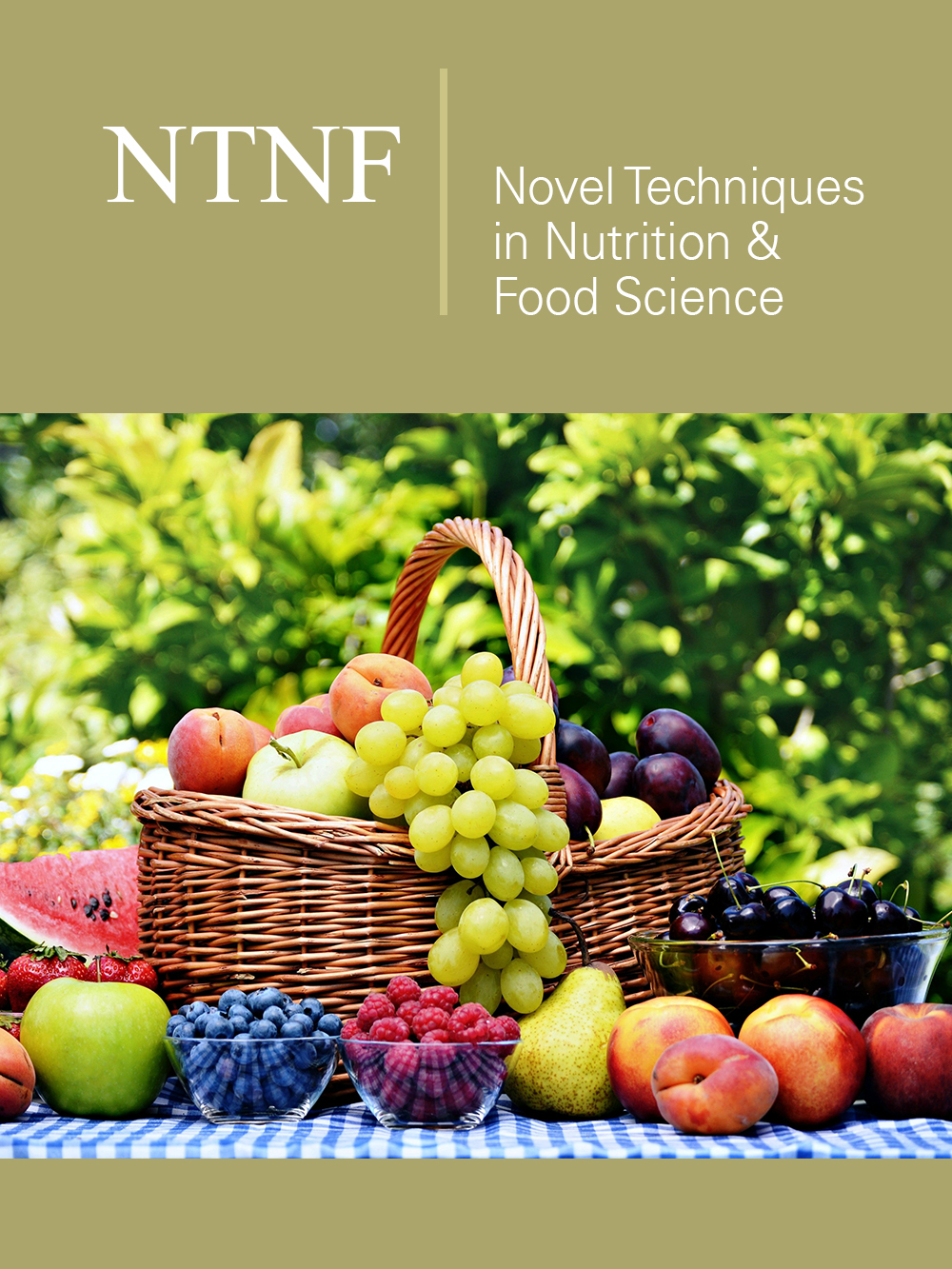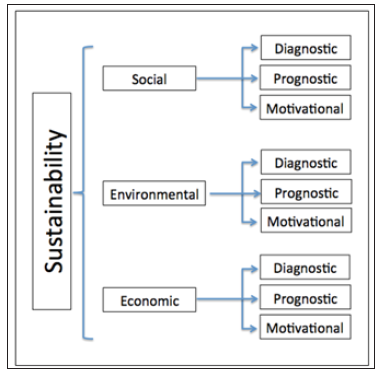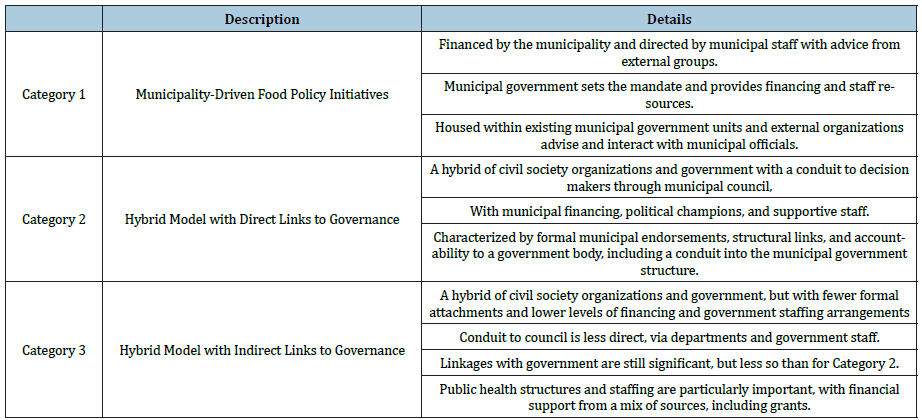- Submissions

Full Text
Novel Techniques in Nutrition and Food Science
A Novel Approach to Local Level Food Policy Case Studies: Application of the Advocacy Coalition Framework
Daphne Page1* and Martin Caraher2
1Researcher at center for food policy, UK
2Professor emeritus of food and health policy, UK
*Corresponding author: Daphne Page, Researcher at center for food policy, UK
Submission: January 28, 2020;Published: February 12, 2020

ISSN:2640-9208Volume4 Issue5
Introduction
This case study-based research was influenced by the growing movement of UK municipalities joining the Sustainable Food Cities (SFC) Network and developing food policies. This comes at a time of “growing tensions between global and local dynamics of food”. The national devolution of power to UK municipalities has resulted in Local Authorities (LAs) joining forces with Civil Society (CS) groups out of mutual need at a time of over £700 million in cuts to local public health funding and social services over the last decade [1,2]. Recognition of diverse skillsets, networks, access to funding as well as formal power for policy change highlight these mutually beneficial partnership arrangement at a time where cities are being seen as drivers of change for social policy [3].
As an examination of local food policy development, this work examined five cases from within the SFC network (Bath and Northeast Somerset (BNES), the cities of Bristol, Belfast, and the counties of Durham and Devon). These cases represent three different coalition structures, ranging from council/public authority-led to civil society-led and a hybrid partnership. This research examined how the concept of sustainability and local food production were understood and linked to one another by Civil Society (CS) and Local Authority (LA) actors to achieve local objectives. Based on the idea that policies and programs reflect the “translated beliefs” of those actors involved in the policy development process [4], this research compared interview material and the content of the local food strategy as a process output. Acknowledging the role of power as one that is central to policy research [5], the cases were examined according to their governance structures, to illustrate how power was concentrated and exercised within these partnerships. Ultimately, this had significant bearing on how sustainability and local food production content were presented in the documents and framed for the audience.
The Advocacy Coalition Framework as a Policy Process Theory
Researching policy means navigating complexity and drawing on appropriate tools in order address questions relating to governance and politics in a simplified way [4,5]. In the case of this research, the Advocacy Coalition Framework (ACF) developed by Sabatier [6] was utilized, drawing on its updated and revised assumptions [4,7]. The framework also acknowledges a methodological flexibility which allows the ACF to be applied to various research approaches and policy topics, while still being centered on the assumptions of the framework [4,7]. This allowed for it to be adapted into a format to specifically address a focus on local level food policy groups.
The ACF’s focus on the beliefs of individual actors within policy coalitions and its recognition of the concept of bounded rationality made it an attractive tool to apply to interviews. Interviews were designed to reveal the beliefs of actors relating to the concept of sustainability and how they felt local food production actions were associated with its social, environmental and economic pillars. These reflected the Policy Core and Secondary beliefs of actors. Policy Core beliefs relate to “the “basic orientation and value priorities for the policy subsystem” as well as “the overall assessment of the seriousness of the problem, its basic causes and preferred solutions for addressing it” [4]. Secondary beliefs address the “instrumental means” for achieving the policy core [4]. Literature on the ACF notes that as a framework, it offers a language for conceptualizing the components of policy work [4,7]. The case study-centered design of this research found significant overlap with components of the ACF in this sense: the subsystem (food policy, in this case), the coalition (the food policy group), the territorial scope (the municipal boundaries of each case study). Smith [4] and colleagues note that the term ‘coalition’ is the title “used metaphorically” in reference to the collection of individual actors. Through conceptualizing each municipality in these terms, the qualities and boundaries of the individuals case studies could be identified. This showed that showing that through these overlapping considerations, the ACF could act as an appropriate lens through which to examine these case studies as place-based and food-specific policy initiatives (Figure 1).
Figure 1: Data collection approach used for strategy documents and interviews.

The ACF Adapted for Local Food Policy Case Studies
Two tools were applied to operationalize the ACF for this work. The first was MacRae & Donahue’s [8] food policy council models, which served to categorise the coalition structures (Table 1). Of their six categories of municipal food policy councils, this research represented three: Belfast and BNES as Category 1, Devon as Category 2, and Bristol and Durham falling into Category 3.
Table 1: Coalition structures of local food policy groups [8].

The second tool was drawn from policy framing theory for the study of social movements. Snow & Benford [9] offered three framing tasks which were adapted to categorise and analyse the beliefs of actors according to the ACF’s Policy Core and Secondary beliefs. These are:
a) “Diagnostic” frames identified unsustainable issues
b) “Prognostic” frames reflected food production actions to address the unsustainable issues, as well which actors should ‘do’ these actions
c) “Motivational” frames were the ideal sustainable outcomes that food production could help achieve. These represented a vision to unify actors for action.
From a policy perspective, this framing model allows a researcher to identify narratives that utilize a “normative leap … from facts to values, from, “is” to “ought”… in such a way as to make is seem graceful, compelling, even obvious” [10]. From the case studies, these beliefs were categorised across the three standard pillars of sustainability (social, economic and environment) [11]. This was an approach that was applied across interviews and food policy documents and as such allowed for comparative analysis of the two data formats (Table 1).
While the ACF historically has been used to examine two or more opposing coalition groups, the circumstances of local level food policy groups required a divergence from this. The coalitions examined for each of the case studies in this research were single entities made up of CS and LA actors working together in lowconflict partnerships to achieve policy goals. By grouping actors according to their ‘role’ as either council or CS, this allowed for power dynamics and negotiation processes to be highlighted within the coalition based on which beliefs were translated into policy.
Conclusion
This research has been conducted at a time when local level food policy initiatives are increasing in the UK and other developing countries, although they remain a relatively new phenomenon [8]. As municipalities seek to transition to more sustainable food systems [12], ‘fine tuning’ these efforts will require guidance. Case studies offer an ideal format, allowing new entrants to the local policy landscape to either scrutinize their potential coalition options or identify structures similar to their own to draw lessons from. This includes not only how to use food production to achieve local sustainability objectives, but particularly in relation to the council working in partnership with civil society in mixed coalition structures.
This research identified and applied tools which dovetailed with key elements of the ACF, offering a novel approach to analyzing local level food policy coalitions using framing theory to examine beliefs within qualitative interviews and policy documents. This offers an approach which could be further applied in the area of food policy development, which has as of yet seem relatively little scholarship using the ACF [4]. This research has shown the flexibility of the ACF as a synthesis of “top-down and bottom-up approaches to implementation” and one that can evolve to examine even the micro-level of food policy partnership [4].
References
- Halliday JJ (2015) A new institutionalist analysis of local level food policy in England between 2012 and 2014. City Research Online.
- Caraher M (2019) New food strategy for England. BMJ 366: 5711.
- Hebinck A, Page D (2017) Processes of participation in the development of urban food strategies: A comparative assessment of exeter and Eindhoven. Sustainability 9(6): 1-18.
- Smith HCJ (2014) The advocacy coalition framework: Foundations, evolution and ongoing research. In: Sabatier PA, Weible C (Ed.), Theories of the Policy Process, (3rd Revise), Westview Press, Colorado, USA, p. 432.
- Cairney P (2012) Understanding public policy: Theories and issues. Palgrave Macmillan, Hampshire, USA.
- Sabatier PA (1988) An advocacy coalition framework of policy change and the role of policy-oriented learning therein. Policy Sciences 21: 129-168.
- Weible CM, Sabatier PA (2018) Theories of the Policy Process. (4th edn), Routledge, New York, USA, p. 416.
- MacRae RJ, Donahue K (2013) Preliminary analysis of how Canadian cities and regional food districts are involved in food systems change. Municipal Food Policy Entrepreneurs. Toronto, Canada.
- Snow DA, Benford RD (1988) Ideology, frame resonance and participant mobilization. Int Soc Mov Res 1: 197-217.
- Schon DA, Rein M (1994) Frame reflection: Toward the resolution of intractable policy controversies. Basic Books, New York, USA.
- United nations world commission on environment and development (1987) United nations report of the world Commission on environment and development: Our common future (The brundtland report). Oxford University Press, Oxford, UK.
- Hinrichs CC (2014) Transitions to sustainability: A change in thinking about food systems change? Agriculture and Human Values 31: 143-155.
© 2020 Daphne Page. This is an open access article distributed under the terms of the Creative Commons Attribution License , which permits unrestricted use, distribution, and build upon your work non-commercially.
 a Creative Commons Attribution 4.0 International License. Based on a work at www.crimsonpublishers.com.
Best viewed in
a Creative Commons Attribution 4.0 International License. Based on a work at www.crimsonpublishers.com.
Best viewed in 







.jpg)






























 Editorial Board Registrations
Editorial Board Registrations Submit your Article
Submit your Article Refer a Friend
Refer a Friend Advertise With Us
Advertise With Us
.jpg)






.jpg)














.bmp)
.jpg)
.png)
.jpg)










.jpg)






.png)

.png)



.png)






